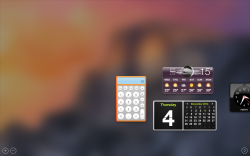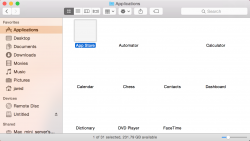Why the openness of the OS X Beta Program did not result in a more widely-pleasing release of OS X 10.10
Please note that some of the following points are, necessarily, guesswork:
- for the transition from iOS 6.x to iOS 7, there was no widespread (public beta) feedback from customers; nothing like the 'Feedback Assistant for iOS' visualised (imagined) above
- iOS 7 was released
- some customers disliked or hated the looks of iOS 7
- eventually, most of those customers treated the looks as great, good or OK
- most customers who continued to dislike or hate the looks were not adversely affected
- Apple looked to the future with a positive assumption that extreme changes to the looks of OS X would be followed by a similar growth in appreciation; that adverse effects would not significantly change customer attitudes towards Apple and Apple products
- early concepts for the user interfaces to OS X Yosemite – before the first seeded pre-release (Developer Preview 1) – did not generate/gain appropriate feedback
- pre-release development of conceptual interfaces proceeded, with the positive assumption (the educated guess) that the end results would be OK
- participants in the OS X Beta Program were predominantly pro-Apple, with too few (or too small a percentage of) testers prepared to disagree with concepts in a way that might dissuade Apple from proceeding with the most contentious aspects of the interfaces
- beyond the OS X Beta Program, public comments on the looks of the pre-release were mostly favourable
- of the pre-release feedback that disagreed with Apple's concepts, some was deferred indefinitely, with the assumption (the simple guess) that adverse effects would have not too negative an effect on customer attitudes in the days/weeks/months following release
- OS X 10.10 was released
- public attitudes towards the looks of the release were, are, worse than could have been predicted from public comments about the pre-release.
The following have been reported, probably many times in this thread:
- A CNET user rating yielded 1.5 out of 5 stars for iOS7. The Yosemite fans have balked at this citing CNET as an unreliable source, hence it can be dismissed, but it was USER ratings, not a CNET review that got the 1.5 stars.
- iOS 7 apparently set a record "reverse migrations," meaning people that installed iOS 7 and then replaced it with iOS 6 while it was still possible.
- Apple sales have gone up anyway. However, iPad sales with iOS 7 have dropped.
- Translucency raised complaints when first introduced in Leopard.
People don't use the iPhone the way they use a computer. The iPhone display is so small most apps are running full screen all the time with the UI only being exposed intermittently. iPhone sales are tied to contracts and it's often the contract, not even the phone or the UI that determines whether someone is going to get an iPhone.
The iPad, which has more screen turf, tends to expose more of the UI, and after the release of iOS 7, sales dropped.
My opinion is that Apple mistook iPhone sales as a stamp of approval for the antics we now see with Yosemite. However, the evidence to raise doubts regarding how well it was liked or disliked was there, if they looked for them.
Hopefully they'll "get it."



